#Lift Us Where Suffering Cannot Reach
Text
Lift Us Where Suffering Cannot Reach by Khashana

Lift Us Where Suffering Cannot Reach
by Khashana
T, 8k, Wangxian
Part of Wei Wuxian's Birthday Gift Exchange Oct 2022
Summary: “I am not looking for a husband,” says Lan Zhan. “I am a lesbian.”
“I’m not a good match for anyone looking for a husband anyway,” says Wei Wuxian, yanking hard at a loose sleeve thread. “I’m, uh. A woman. Transgender.”
In which Lan Zhan and Wei Ying enter into a marriage of convenience, try on dresses, watch Star Trek, and accidentally fall in love.
Kay's comments: This story was so incredibly sweet and I enjoyed it a lot! There was a bit of angst that hit at the end, but got resolved very quickly. Apart from that, it's mostly so much yearning and pining and Wangxian falling in love in a marriage of convenience and gender euphoria and I love that for them.
Excerpt: “So…” says Wei Wuxian finally. “Do you have any questions I can answer?”
Lan Zhan considers the question. She already knows Wei Wuxian has a good career as a software engineer, high social status as the ward of the Jiangs, and no real health issues, courtesy of Uncle.
“What do you enjoy doing as a hobby?” she asks.
Wei Wuxian looks taken aback. “I play the flute,” she says eventually. “And I read a lot. Nonfiction mostly. I like learning new things.”
Lan Zhan nods. “I enjoy poetry and romance novels,” she offers.
“Not that this isn’t a worthwhile train of thought,” says Wei Wuxian, “but before I forget: what I actually meant was, do you have any questions about…” She makes a vague gesture at all of herself. “The trans thing?”
Oh. Lan Zhan thinks about it.
pov lan wangji, modern setting, modern no powers, lesbian lan wangji/wei wuxian, trans female wei wuxian, arranged marriage, marriage of convenience, married lan wangji/wei wuxian, strangers to lovers, wifes to lovers, developing relationship, pining, mutual pining, gender euphoria, light angst, angst with a happy ending, domestic bliss, domestic fluff, moving in together
~*~
(Please REBLOG as a signal boost for this hard-working author if you like – or think others might like – this story.)
#Wangxian Fic Rec#The Untamed#Wangxian#MDZS#Kay's Rec#February 2024#Lift Us Where Suffering Cannot Reach#Khashana#teen#short fic <15k#pov lan wangji#modern setting#modern no powers#lesbian lan wangji/wei wuxian#trans female wei wuxian#arranged marriage#marriage of convenience#married lan wangji/wei wuxian#strangers to lovers#wifes to lovers#developing relationship#pining#mutual pining#gender euphoria#light angst#angst with a happy ending#domestic bliss#domestic fluff#moving in together
37 notes
·
View notes
Text
On Individualism and Collectivism
I saw a post promoting collectivism over individualism going around a while back, which inspired me to write a post about a philosophical issue I've been thinking about for a while. I was going to reblog a version of that post with some interesting commentary added, and add even more commentary to it, but it was getting incredibly long, so I thought it was best to make my own post, and just include a link -- here -- to the post with the relevant commentary, to which I will occasionally refer in the discussion below.
I got into a disagreement a few years ago with another academic philosopher about whether feminists must be individualists, in which I attempted (unsuccessfully, I'm afraid) to explain a distinction between what I have since started calling surface and fundamental individualism and collectivism:
Surface individualism or collectivism describes the emphasis of the cultural ethos that members of a society are taught.
Fundamental individualism or collectivism refers to where the fundamental locus of ethical value is taken to lie: the individual or the community.
Here's my overall thesis, fully explained and argued for under the "keep reading" link (which may be similar to what @reasonandempathy was trying to get at in the first reblog comment on the post linked above):
Surface collectivism is probably better than surface individualism because it promotes the well-being of more people; but fundamental individualism is necessary to justify the protection of individual rights to autonomy over one's life and body.
Neoliberal individualism is surface individualism. The culture emphasizes individual choice, individual action, makes individuals feel like they must always support themselves and rely on no one else, tells them that that is what constitutes real "freedom." This is the outlook that the other philosopher was (correctly) arguing is wrongly thought, by some white Western feminists, to be necessary to feminism; it is sometimes promoted by Western aid agencies that encourage women in the Global South to start their own businesses to achieve financial independence from (apparently) oppressive family and community structures. Surface collectivism would mean a culture that tells people to always think about their relationships with others, how they are embedded in a community, what they can accomplish by working with others. That sounds a lot better, especially to those of us who are well-acquainted with the pernicious, alienating consequences of surface individualism.
Fundamental collectivism says that only the collective matters in itself, or has intrinsic value, and any given individual has significance only a means to the survival and flourishing of the collective. It's ambiguous, but this seems to be the attitude being articulated in the tweet at the top of the linked post. And that is what @conservativemalarkey talks about in the third comment on that post as a justification for forcing anyone born with a uterus and ovaries to give birth: according to fundamental collectivism, that person's reproductive capacities are in the first instance a resource for the community to reproduce itself, and their individual preferences about what to do with their body do not matter. There is no individual right to bodily autonomy; there is only the duty to perpetuate the community. To put it in the terms that @nothorses brought up: the collective has rights but no obligations/duties to its individuals; individuals have obligations to the collective, but no rights that it is required to respect.
That's why I have come to believe (and was attempting to argue with the other philosopher) that fundamental (not surface) collectivism is incompatible with feminism: it provides no grounds to protect individuals' rights to bodily autonomy. That, of course, harms everyone; historically, communities have often forced men and boys to risk their lives going to war to defend the community, or to add to its wealth and territory. But it especially notably harms those who are assumed to have the capacity to gestate and bear children (gendered by cisnormative society as women and girls, giving rise to sexism and misogyny that affect anyone associated with that category), because that capacity is, so to speak, the "limiting reagent" for reproduction in the community: it is a scarce resource, far more limited in the lifespan, costly in time and energy, and dangerous to the life and health of the possessor than the capacity to fertilize. For that reason, patriarchal societies (incredibly widespread historically and geographically) effectively regard the reproductive capacities of potential child-bearers as community property, or as a commodity regulated by the community. A (presumed) woman*'s value, and the purpose of her life, consists in her ability to reproduce within the socially approved constraints; women's sexual activities are everyone's business; everyone feels entitled to comment on the bodies of women of reproductive age, especially when pregnant, and how they raise their children.
[[*Meant to encompass anyone perceived as a woman, which in most contexts, historically, also means being assumed to have childbearing capacities; includes AFAB people who do not identify as women as well as trans women who pass as cis. The general attitude also, of course, affects trans women who don't pass as cis but are understood to be communicating a self-identification as a woman.]]
Can a community be said to flourish if a large number of the individuals in it are miserable? Structurally, yes: it can successfully perpetuate itself, grow, become wealthy, while all its individuals dutifully sacrifice themselves to it. Ironically, for a society based so heavily on surface individualism, modern capitalism looks a lot like that: individuals are expected to sacrifice themselves for The Economy, which grows and maintains itself like an organism without regard for whether the vast majority of the individual 'cells' that make up its organs and tissues are satisfied with their lives. This is also true of patriarchal cultures in which at least half of the population is limited in the way they can live their lives, and are taught to see this as natural and inevitable.
Fundamental individualism, by contrast, says that the locus of value is the individual: what matters is the well-being of individual human (or sentient) beings, and communities are valuable only insofar as they contribute to the well-being of their individual members. Fundamental individualism is perfectly compatible with surface collectivism, and it is very probably true that most individuals will be happiest if they live in communities that emphasize their communal ties and encourage them to think of themselves as enmeshed in and dependent on a community. BUT fundamental individualism will say that this kind of culture is good because it is what is best for the greatest number of individuals.
According to fundamental individualism, the collective, qua collective, has no value independent of the individuals in it. Individuals have rights to autonomy and to have basic needs met which the community must respect. Do individuals have obligations to the collective? Yes, but only as a surface shorthand for their obligations to all the other individuals that make it up. Communities, cultures, collective forms of life have no intrinsic value, because they are not independently sentient: they cannot feel pain, pleasure, desire, or satisfaction. The loss of communities and cultures is terrible because of the harm that it causes to the individuals who lose their sense of connection, identity, and purpose. But if a way of life systematically fails to promote the well-being of a great many of its members, and/or systematically violates their rights in a way that cannot be remedied without ending that way of life, then it deserves to be ended. Again, most of us here have no trouble saying that about modern capitalist society, but it's equally true of any form of social organization.
Are people (outside of academic philosophy) generally familiar with Ursula K. Le Guin's story "The Ones Who Walk Away from Omelas"? Here's the text, available from libcom.org (short for "libertarian communism," apparently). Spoiler alert: episode 1.06 of Star Trek: Strange New Worlds, "Lift Us Where Suffering Cannot Reach," is very obviously based on it. That is one of the starkest, most evocative illustrations of collectivism that is not balanced by consideration of the rights and well-being of individuals: one individual is forced to live in unending misery so that the rest of the community can be happy.
"But that's not real collectivism!" someone will protest. "Real collectivism means everyone takes care of each other! They would have compassion for every member of the community and never allow that to happen to one of them!" Well, it depends on what you mean by "real." Many forms of surface collectivism could mount an argument against that arrangement, on the grounds that a healthy community must care for all its members, even (or especially!) the humblest and most vulnerable. From the perspective of either surface or fundamental collectivism, it might be argued that permitting any member of the community to suffer in this way would damage the cohesion of the community by encouraging callousness regarding the suffering of (certain) other members.
But nothing about fundamental collectivism says that a community must care for all its individual members in order to flourish; on the contrary, it says that individuals do not matter for their own sake, but only for what they can contribute to the community. Fundamental collectivism can only offer an indirect, instrumental argument that allowing the Omelas situation would harm the community because of how it would affect the community ethos. In Le Guin's story, all members of the community do know about the condition of their society's thriving; that's how some of them decide that they should walk away. But in the SNW episode, most people do not understand what their happiness rests on; they can blissfully believe that the community does care for all its members, so fundamental collectivism could not find anything wrong with the arrangement.
Crucially, fundamental collectivism cannot capture the real reason most of us will think the Omelas situation is horrifying: that it violates the rights of an individual who does not choose to sacrifice their well-being for the sake of the community, but is forced to suffer so that the community can thrive. If you're thinking it would be OK if, and only if, the individual did choose to be the sacrifice for the community: that's something that might be promoted, even glorified, by surface collectivism, which would encourage people to see their individual happiness as less important than the well-being of the community. But fundamental collectivism could not account for the profound ethical difference between a chosen and a forced sacrifice: the importance of individual autonomy; the principle that no one should be able to make such a momentous choice about the course of an individual's life except that individual.
Mind you, this does not mean that a fundamentally individualistic ethics will necessarily rule the Omelas situation impermissible. There are some forms of fundamental individualism that could justify it -- notably, utilitarianism, which would say that the suffering of one individual, however appalling, is far outweighed by the perfect happiness of thousands or millions of other individuals. Fundamental individualism is not sufficient to rule it out; and you might not think it should be ruled out, considering the numbers involved. But fundamental individualism is necessary to even say what the problem is. The only objection that fundamental collectivism could offer doesn't even locate the problem in the terrible forced suffering of the individual, but in the way that knowing about it might affect the cohesion of the rest of the community.
So while I'm generally in favor of a surface-collectivist ethos, I'm convinced that any fundamentally collectivist ethical theory has profoundly immoral consequences. The ultimate locus of ethical value must be the individual. It's fine for a culture to encourage individuals to prioritize the community over themselves, but there is something genuinely wrong with the community forcing sacrifices on its members, and that can only be accounted for with reference to irreducible individual rights.
#individualism vs collectivism#individualism#collectivism#ethics#moral philosophy#philosophy#the ones who walk away from omelas#snw spoilers#snw 1.06#snw 1x06#lift us where suffering cannot reach
78 notes
·
View notes
Text




#star trek#faceapp#hair styles#pike#christopher pike#captain pike#strange new worlds#star trek strange new worlds#snw#star trek snw#lift us where suffering cannot reach
10 notes
·
View notes
Text
For anyone who would like to read "The Ones Who Walk Away from Omelas," the source text for SNW's "Lift Us Where Suffering Cannot Reach" episode.
https://archive.org/details/the-ones-who-walk-away-from-omelas
#Star Trek#Strange New Worlds#Lift Us Where Suffering Cannot Reach#Ursula K. Le Guin#Omelas#the ones who walk away from omelas
214 notes
·
View notes
Text
y'all have we been collectively sleeping on pike and batel being in an open relationship!!! poly rights!!!!!
12 notes
·
View notes
Text

#star trek: strange new worlds#star trek: strange New worlds spoilers#lift us where suffering cannot reach#snw spoilers#snw#star trek snw#powered by a forsaken child#tv tropes#IM SO BUMMED OUT#pls let them go back someday and save hiiiimmmm#first servant
74 notes
·
View notes
Text
The Needs of The Many
The First Servant, COVID-19, Pike, Spock, and SNW’s Overarching Themes
So, yesterday’s episode of Strange New Worlds was very… heavy.
Strange New Worlds overarching themes this far have been fate, perspective, and sacrifice.
Even the audience knowing who lives and who dies based on having seen TOS actually SERVES that narrative! Uhura, Spock, Chapel, M’benga, even Pike, they have no idea that they can’t die until after TOS and it’s films. While Samuel Kirk has no idea he’s going to die by the end of TOS’s first season. They don’t know, but we do, and even then, crazy things could still happen. Nothing is set in stone, nothing is exactly as it appears.
The pilot’s most blatant message is that the future is what we make it. That we can choose whether we live (warp drive) or die (warp bomb). As well as that growth can be found even in the most inhospitable and unknowable environments like the vacuum of space.
Children of the Comet declares that just because we know something will happen, doesn’t mean it’ll do so in the way we expect. Whether or not it will br at immense cost to ourselves is undefined (Mahanit does not perish destroying Persephone 3 thanks to Enterprise’s intervention).
The Ghosts of Illyria establishes life after being forcibly changed shape, and the message we leave behind when we go where others cannot follow. What appeared monsterous was only there to help the crew survive what they themselves did not. It also establishes Rukiya, who in some ways is going through something similar to Pike. Instead through the outside perspective and grief of Dr. M’Benga, her father who is desperately trying to save her life, sacrificing much in doing so.
Memento Mori celebrates a Starfleet holiday where those who were killed in action are remembered, and La’an takes her first steps toward actually acknowledging her grief over what happened to her and her family on the Puget Sound at the hands of the Gorn. We also get Hemmer’s Aenarian perspective on death, and Uhura being uncertain what her purpose is in the face of it.
Spock Amok forcibly changes Spock and T’Pring’s perspectives on each other’s lives through an accidental body swap. The R’Ongovians are won over to the side of the Federation by Pike using their own radical empathy tactic. Neither Spock or T’Pring’s lives, or the R’Ongovians, are what they appeared to be to the other side.
Now, Lift Us Where Suffering Cannot Reach, asks us whether the sacrifice of a small child enduring a slow and painful death at the hands of a machine beyond its creators’ comprehension is worth the comfort and stability of an entire civilization.
In this case, do the needs of the many outweigh the needs of the one?
In this particular case, I think the answer is no.
I believe this will profoundly change how Pike perceives his own, seemingly, inevitable sacrifice and the reasons that he does it for. I think with every passing episode of Strange New Worlds, it’s going to prepare him for that moment in its own unique way. Hopefully, by the time he reaches it, he will be sacrificing himself with a sound heart and mind (which is something he does not have right now but we’ll get into that later).
If we can extrapolate from the dialogue and facts of the episode, Magellus isn’t at all the enlightened utopia that it pretends it is. The guard that Alora kills calls their society a hell. They refuse to help others in need with their technology, including colonies of their own desperate people. The blood of generations of small children is on the hands of everyone who is complicit in The Ascension of The First Servant. The whole thing is very Those Who Walk Away From Omelas by Ursula K LeGuin. At least in this case, those who are walking away (namely, The First Servant’s father) intend on returning with reinforcements.
All I can think of is our culture’s attitude toward front line essential workers and disabled people even now as the pandemic rages on. How our culture and our government is so desperate to return to a sense of “normalcy” that in the US we have the highest rate of COVID-19 deaths in the world to date.
Our normal was never good, and in our insistence to return to it, immunocompromised people die in droves, the comorbidity of being a minority, for the greater “good” of our civilization. The victims are in the minority, and no matter how much we call it a noble sacrifice to our sense of normalcy or our economy, it is unprecedented, horrendous, and worst of all unnecessary. Most of all because the people who die from COVID don’t choose to, just like raffling off a child to become The First Servant. They don’t consent to their deaths, the society that sustains the bloody cycle does.
It is not the minority that should be sacrificing itself, but the majority that should change so that everyone can live, no deaths required. Whatever the discomfort may be, it’s better than the alternative. The Magellans could leave their city, their so-called paradise if they really cared that a child had to be murdered every few years to sustain their way of life. But they do not and have not, and may never unless a great unrest takes place.
Now how does all of this apply to Pike’s journey?
I keep mulling over in my head the key similarities and differences in the Magellan edict and Pike’s mantra from Through The Valley of Shadows.
Science, Servitude and Sacrifice VS Service, Sacrifice, Compassion, and Love
What the Magellans lack that Pike (and in turn the Federation) does not is the additions of compassion and love. Which is why the First Servant’s sacrifice is in vain, as it is to a unloving and unsustainable culture. It is also, ironically, what Pike lacks regarding, not other people, but himself.
It’s something we have seen him struggle with since the very beginning, as in The Cage. As in Dr. Boyce saying “damnit Chris you treat everyone on board like a human being except yourself!” When he says he serves the living and the dying, he is absolutely referring to Chris, who lives like he’s dying.
Pike, like many other captains we know, has a serious Martyr/God complex. He’s depressed on an existential level, he is looking for reasons worth dying for rather than for reasons to live. He’s even treating his eventual disability like death so he doesn’t have to think about living! Even though he will very much still be alive after the radiation takes his voice and mobility away from him. “If I don’t save them who will? If I don’t die for a cause who will? Surely, I am the only person who can do this, this is the only way I can do this, and there’s no unforeseen consequences to this action I’ve yet to take! Sounds convenient!”
He’s clinging to terminal deadlines because he doesn’t want to think about the future, the real future, the one he’s a part of. He’s constantly, constantly looking for a good enough reason to die so that the people who love him will stop arguing with him about it. Pike is using his paragon of martyrdom persona and his captaincy to hide that he is incredibly depressed. He doesn’t want a future that he can’t imagine, so he’s decided it’s going to end with the only answer he’s received, regardless of it’s context.
He puts very, very little value on his own life. Constantly hurling himself into immediate danger throughout his time on Discovery, out of guilt and out of principle, and out of his own unaddressed emotional struggles. I think the only reason he’s (mostly) stopped doing that in Strange New Worlds is that he is holding out for the big one. He has to live so he can “die” later. He’s got “I give my life for you” down pat, has learned to tolerate “you give your life for me” but severely lacks in “nobody gets left behind.”
Spock ends up following this pattern too under a veneer of logic, and as much as both of these characters preach that the needs of the many outweigh their own, and that that mantra holds truth and nobility to it, that doesn’t mean they aren’t worthy of saving as well.
Spock puts himself at great risk to ensure Pike lives a full life in The Menagerie (messy/problematic metaphors aside), Kirk and the Enterprise crew risk their lives to bring Spock back from the dead in The Search for Spock. Nobody gets left behind, the needs of the few motivate the many to change themselves, often for the better. ‘You gave your life for us, we give our lives for you’ ensures everyone lives, not that one person dies. Even when that one person believes their purpose is to die for others.
My hope is that tragedy Pike witnessed in Magellus puts things into perspective for him and that other episodes continue to do so. So that when the time comes, he doesn’t sacrifice himself because he doesn’t think his life is important, or at least, that it’s only important because of that moment. Hopefully before the end Pike figures out the most important things to him about living. Learning to value himself before the accident permanently changes him and his capabilities. That when he does sacrifice himself it’s because he loves life, and loves who he is as a person, and gives of himself in spite of that. Or perhaps something else may come into play…
Given the overarching themes of perspective in Strange New Worlds, I don’t think his fate, or where his storyline appears to end in The Menagerie, are exactly as they seem. And I am greatly looking forward to seeing that narrative spun if SNW continues to move in this direction.
#LONG post#Star Trek meta#meta#strange new worlds#Star Trek#star trek strange new worlds spoilers#Star Trek strange new worlds#snw#Star Trek snw#lift us where suffering cannot reach#Captain pike#captain christopher pike#Christopher Pike#Chris Pike#Star Trek tos#Spock#the menagerie#through the valley of shadows#star trek discovery#the search for Spock#star trek iii: the search for spock#operation annihilate#children of the comet#the ghosts of Illyria#memento mori#Spock amok#those who walk away from omelas#ursula k. le guin#ichayalovescaptainpike
96 notes
·
View notes
Text
So is no one going to talk about the last Strange New Worlds episode ending in LITERAL CHILD MURDER? Like, not just abstract child death, but a child that I instantly bonded with over the course of the episode gets strapped to a chair and gets the life sucked out of his brain to power a floating city?? WHY were the city founders like “ah yes, child brains, the perfect fuel” like WHAT you have all this tech and you can’t just live on the lava planet??? And there was NO happy ending, NO chance of saving the kid, everyone just had to live with that!
No WONDER they gave us a happy mind swap episode last week they wanted to ROCK us! THEY SHOWED US A CHILD’S ROTTING CORPSE! SHE WASN’T EVEN GUILTY ABOUT IT JESUS
#Star Trek#star trek strange new worlds#strange new worlds spoilers#strange new worlds#lift us where suffering cannot reach#I have a lot of thoughts#child murder#child death
92 notes
·
View notes
Text
what kind of lowercase-fanfiction-title-ass episode name is “lift us where suffering cannot reach?”
#star trek#snw#strange new worlds#lift us where suffering cannot reach#BRO. i am choking up about it though#bran thinks n stuff#emersen thinks n stuff
81 notes
·
View notes
Text
Round One


#best snw character competition#nurse Christine chapel#nurse chapel#christine chapel#alora#Alora Star Trek#lift us where suffering cannot reach#st#snw#snw s1#strange new worlds#best star trek character competition
8 notes
·
View notes
Text
thoughts on "lift us where suffering cannot reach"

i've seen a couple different reviews of this episode, some positive, some not. i'll tell you my opinion right off the bat: superb.
i want to talk about some of the common criticism that i've seen regarding the episode and my thoughts on those points.
continuity issues with the prime directive
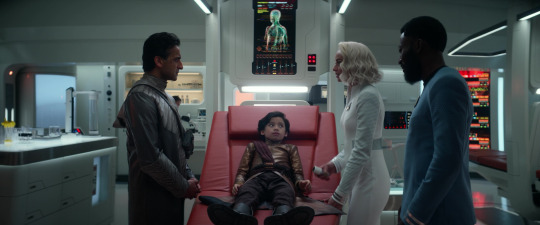
so i've seen this a couple times now. some people are saying that pike should have saved the first servant bc a life is more important than the prime directive. (think the beginning of star trek: into darkness. i bet the trek fans upset with this episode would HATE the comparison lmao.) bending/breaking the rules for the sake of a moral cause is kind of star trek's bread and butter. it happens. it happens all the time, actually. crews find ways to circumvent the prime directive in order to achieve their own (selfless, usually!) goals. in the tng episode "pen pals", data goes AGAINST the prime directive to save an alien child from a planet that's about to be destroyed.
so, let's recap. spoilers ahead.
a shuttle under attack hails the enterprise and asks for help. enterprise attempts to deescalate the situation, but the attackers fire on the enterprise, and the enterprise is forced to fire on their ship, destroying the attackers. the first servant is transported to the enterprise for medical care. the enterprise holds an investigation of the attackers. during this time, the first servant is almost kidnapped, but spock finds him and they return the first servant to majalis, where he undergoes the ascension. pike realises that the ascension is basically torture for the good of society and attempts to stop it, but he is overpowered. pike is told that attempts to remove the first servant from the device will kill the first servant. pike stares moodily out of the window, and the episode ends.
(this leaves out ALL of the poetry, but you get it.)
i get why this episode rubs people the wrong way. it doesn't feel very heroic. in many ways, pike has caused the suffering of this child by interfering with the kidnapper's attempts. but how is he supposed to know that? no one told him! the story would be VASTLY different if the kidnappers had come to pike and told him, or if the investigation revealed more information, but it didn't. pike is doing his best to keep this child safe! how the hell would he know that the first servant is destined to be a human battery?
in essence, it seems like people are mad that pike is... *checks notes* doing his job? i don't know.
the whole point of this episode is that sometimes succeeding can lead to a larger failure. in this case, a moral and ethical one. it's very much a "we did it. but at what cost?" moment.
2. cynicism and unhappy endings

this one i understand. i get it. so far, snw has been pretty feel-good. "spock amok" was a delight, and this episode is a hard left from that. but it's not unheard of for star trek to have bummers. ds9 is full of uncomfortable truths and allegorical storytelling that doesn't always work out for everyone.
for example, the episode "cardassians" revolves around determining who will gain custody of rugal, a cardassian child born on occupied bajor and raised by bajorans. it's not a hijinks-bodyswapping story. sisko is confronted with the option to a) send rugal back to bajor with his adoptive parents who love him but hate cardassians, therefore teaching rugal to hate himself or b) send him to live with his biological father (who is a war criminal, right?) on cardassia with cardassians, who ruagl has learned to hate. it's a great story, but not a fun one. and honestly? i don't think sisko makes the right choice by the end of it. i don't think there's a right choice for him to make.
also, remember when spock died in the end of wrath of khan? yeah, that was a very similar situation. the suffering of one, given for the lives of many.
i don't want to tell people to suck it up and get over it, because that's neither helpful nor kind, but if you're telling stories about the world now and what it could/should/can be, there can't just be laughs. there needs to be introspection and cautionary tales and emotions of all kinds.
also, this story is inspired by "the ones who walk away from omelas" which is NOT a happy story.
3. pike's romance subplot and saviour complex
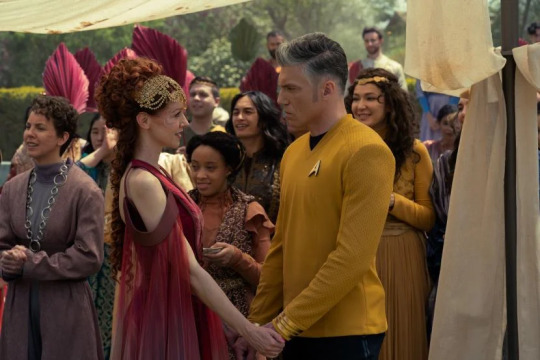
i honestly don't get the problem with this. i thought that pike and alora's relationship was handled really gracefully.
the major issue, i guess, is that the pike/alora romance somehow cheapens the epsiode? but even that i don't understand. giving pike a personal connection to alora prompts him to help as much as he does, leading to the first servant's willing ascension and unwitting suffering.
and there's a tragedy in that. pike's desire to help makes things worse. because pike lacks cultural context and understanding, he fails to address the institutionalised violence and horror inflicted on the first servant. that's a very poignant lesson, and an important one, especially when looking at the world around us.
also, it's a tragedy, and i LOVE a good tragedy.
#star trek#snw#strange new worlds#star trek snw#snw spoilers#captain pike#christopher pike#lift us where suffering cannot reach#episode analysis#spock#i do love a good tragedy
50 notes
·
View notes
Photo
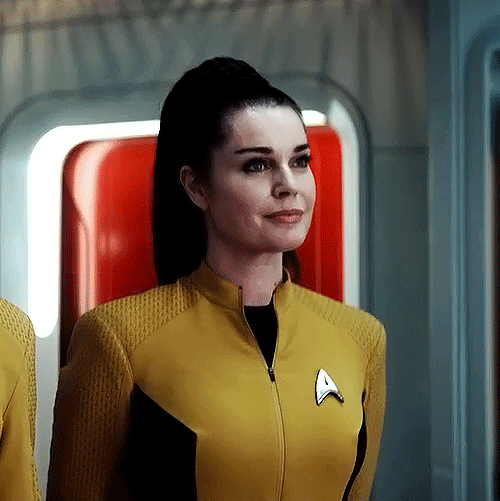
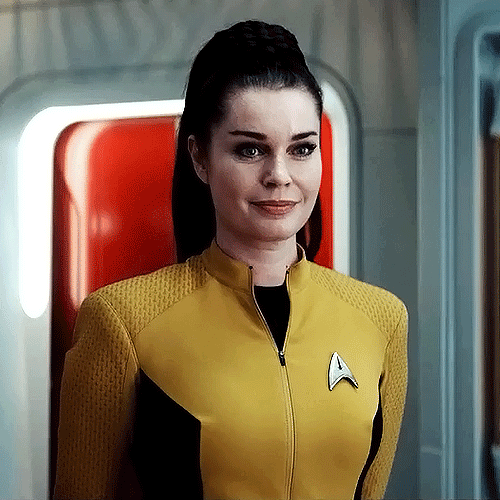
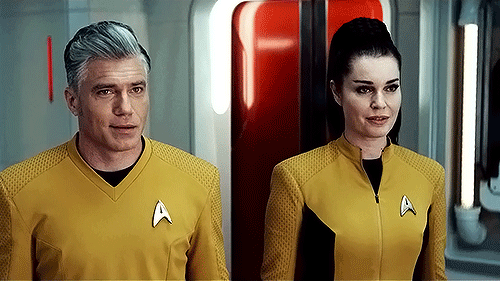
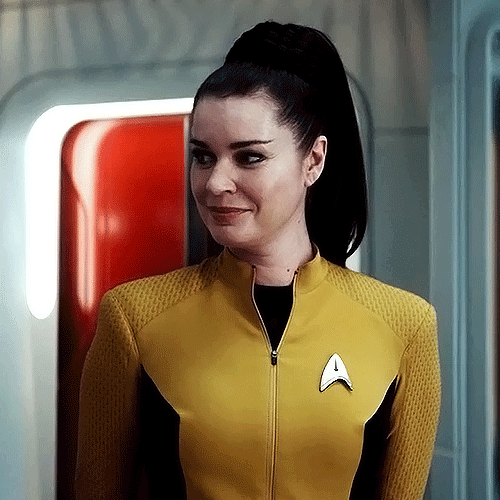

Una Chin-Riley (Number One) - Lift Us Where Suffering Cannot Reach
#Una Chin-Riley#Number One#Rebecca Romijn#captain pike#captain christopher pike#Anson Mount#Star Trek Strange New Worlds#star trek: strange new worlds#stsnw#snw#star trek#star trek babes#my gifs#my edits#tv edits#tv : Star trek#Star Trek Strange New Worlds Episodes#Lift Us Where Suffering Cannot Reach#that knowing side eye#I LOVE IT!#I LOVE HER!#I LOVE HIM!#I LOVE THIS SHOW!!!
46 notes
·
View notes
Text
So the latest SNW episode “Lift Us Where Suffering Cannot Reach” had some really interesting ideas, but I can’t help but think that the entire thing was just structured wrong. We were hit with the big twist that makes you rethink everything you know about this planet... and then get a couple minutes of “well that was deeply fucked up, anyway not gonna talk to you again.” This could have been a powerhouse of a moral quandary to really put Pike through his paces, but it just... wasn’t. And I don’t entirely understand why. Heavy spoilers for the episode below.
There are two main issues here. The first is that the big reveal of what the First Servant’s Ascension truly means doesn’t come until very close to the end of the episode. And the second is that we never truly get the sense that the planet’s survival does depend on the Ascension, the way Alora claims. Restructuring the episode would have made the moral dilemma much more potent and immediate, and give Pike an actual stake in the story.
Imagine with me an alternate version of the episode, where Gamal’s fake kidnapping of the First Servant happens much sooner, around the halfway point. Prior to this, we’ve actually seen Majalis firsthand -- a beautiful, prosperous world. But with the First Servant missing, and no Ascension in sight, everything goes to the shit. The planet is ravaged by storms, rivers of lava destroy cities -- it’s just chaos. Enterprise tries to help, but there’s nothing the crew can do.
Then, when the First Servant is found, Gamal is so desperate that he just throws himself on Pike’s mercy. He explains that during the Ascension, the First Servant will be connected to an ancient machine that uses his neutral network to hold back the storms and the lava. The child will be in immeasurable pain, and everyone knows it, but Majalis has thrived like this for centuries and it’s just an accepted part of their culture. And Gamal begs for Pike to protect his son, to keep him aboard the Enterprise indefinitely.
Now, the decision is Pike’s. He can return the First Servant to Majalis, condemning an innocent child to a life of suffering (and incidentally, following the Prime Directive). Or he could refuse to send the child back, condemning an entire world to death. There is no Option C.
This makes Pike more of an active participant in the story, trying to find a decision he can live with. We could also have other crew members offering Pike their advice. Some believe that it’s abhorrent to condemn an innocent child to that fate, no matter what. But others believe that while the situation is deeply fucked, it ultimately comes down to the needs of the many vs. the needs of the one. Worst of all, we get to know the First Servant more after the reveal. He’s a sweet boy, a genius -- and he wants to return to Majalis to fulfill his destiny. And ultimately, Pike chooses to return the First Servant to his fate and save Majalis.
Honestly it would echo the knowledge of his own future quite well -- sometimes you’re destined to suffer to help others, and there isn’t any escape. The end of the episode would have a very different feel. It’s not just that he failed to save a child. He condemned that child, himself, and he has to live with that choice for the rest of his life. It would be much darker, much more visceral... and ultimately a much more satisfying episode than the one we got.
#star trek#strange new worlds#star trek: strange new worlds#lift us where suffering cannot reach#snw spoilers#strange new worlds spoilers#personal
46 notes
·
View notes
Text



#star trek#faceapp#ortegas#erica ortegas#una chin riley#number one#spock#mr spock#strange new worlds#star trek strange new worlds#snw#star trek snw#lift us where suffering cannot reach
8 notes
·
View notes
Text
When I started watching Star Trek, the one I remembered best having already watched was City on the Edge of Forever, when Captain Kirk must lose the love of his life for the sake of galactic history.
When I started watching M*A*S*H, my favorite character whom I identified with more’n any other character in all fiction was Henry Blake, who went on to die when the actor left the series. Many or most of M*A*S*H’s best episodes were sad stories. I like to call it a situation tragedy with comic overtones.
The first episode I saw of Doctor Who was Genesis of the Daleks, when the Doctor questions his right to destroy his eternal enemies the Daleks in their prehistory just long enough to lose the chance. Even the Doctor, in a broadcast history of almost sixty years, loses in a handful of episodes.
I like to say I like it when my heroes don’t win all the time.
But, damn, this week’s SNW
26 notes
·
View notes
Text
Major spoiler ahead for the recent Strange New Worlds ep "Lift Us Where Suffering Cannot Reach". So if you're not blocking tags, look away.
Okay, with that out of the way, I'm left wondering if the writer of the episode thought it would be an interesting juxtaposition if we had the one father who was unable to save his own child trying to help M'Benga who's trying to save his daughter. But to me there's an ironic contrast in that you had an episode that borrows heavily from an Ursula K. Le Guin story on social inequality while failing to recognize an implicit inequality issue with M'Benga's actions.
If you can use a transporter to extend the lifetime of someone who doesn't have long to live (which seems to ignores canon and would invalidate a number of story lines including Amok Time - see below), who gets to use this technology to potentially save the life of a loved one? M'Benga has access to a transporter. Think of all the people who don't. What's to stop a Starfleet admiral from doing this with a loved one? Why are their loved ones more worthy than others? How many non-Starfleet people might be asking for their loved ones to be saved through official channels only to be turned down? How many times would these people than try to get covert help from someone who does have access to a transporter?
I feel like the writers behind SNW didn't think through the social implications of their use of the transporter in the M'Benga backstory. And really good science fiction writers try to think through the implications of any technology they create for their fictional universes.
Don't get me wrong. I like SNW. But I think in this one case they were trying to be a bit too clever with having this tragic issue for one of the characters and kind of fumbled it. And I certainly understand why there are plenty of people who like this bit of M'Benga's history and I have no issue with that. This post is by no means a criticism of anyone in the fandom. It's just my expressing a personal wish that the writing team had thought this through more carefully.
P.S. In case you're wondering about my comment about Amok Time, if you could really use the transporter as described in SNW, Kirk need not have violated orders to save Spock's life. Put Spock in the transporter buffer, complete the diplomatic mission, then head to Vulcan and rematerialize him.
13 notes
·
View notes